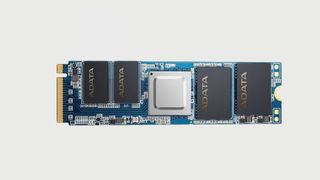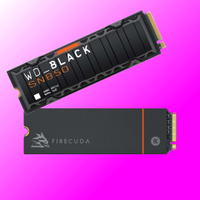Adata teases PCIe Gen 5 SSD with monster 14GB/s bandwidth
But what about those pesky IOPS?

In the lead up to the techgasm that is CES in January, Adata has teased its upcoming PCIe Gen 5 SSD. The big news? Fully 14GB/s of claimed throughput. And there was much rejoicing. Well, kinda.
Inevitably, Adata is keeping most of its powder dry regarding further details of the new drive, only saying that it sports a "patented heat dissipation design."
What we don't know, but would really love to understand, is how the new SSD stacks up when it comes to 4K random access, which depends on IOPS performance. Arguably, the best PCIe Gen 4 drives offer plenty of peak through, with numbers around 7.3GB/s for reads and 7GB/s for writes.
However, those drives also top out at under 100MB/s for 4K single queue depth reads and under 300MB/s for writes. It's those numbers we think need improving. So, 14GB/s (reads, we assume, Adata doesn't say), is nice. But what about those 4K numbers, eh?
Back in July, Adata showed of a protoype Gen 5 drive with claimed 1.8M read and 1.6M write IOPS courtesy of the Silicon Motion SM2508 controller chip, which is roughly 30 to 50% better than the fastest Gen 4 drives.
If that's reflected in the final retail drive, it would be a decent start.
We had hoped PCIe 5.0 SSDs would be arriving last month, as per the initial noises from AMD and its supporting motherboards, but that Gen5 launch window has long closed and rumours are that difficulties in getting hold of the good 14GB/s capable NAND is what's held us back.
The biggest gaming news, reviews and hardware deals
Keep up to date with the most important stories and the best deals, as picked by the PC Gamer team.
We'll see how long it takes for that speedy memory to hit our SSDs once they launch sometime next year.
Best SSD for gaming: The best solid state drives around
Best PCIe 4.0 SSD for gaming: Speedy drives
The best NVMe SSD: Slivers of SSD goodness
Best external hard drives: Expand your horizons
Best external SSDs: Fast, solid, and portable

Jeremy has been writing about technology and PCs since the 90nm Netburst era (Google it!) and enjoys nothing more than a serious dissertation on the finer points of monitor input lag and overshoot followed by a forensic examination of advanced lithography. Or maybe he just likes machines that go “ping!” He also has a thing for tennis and cars.
Most Popular







